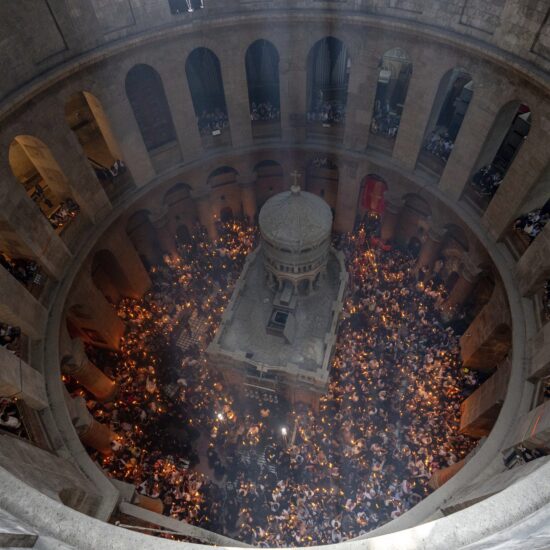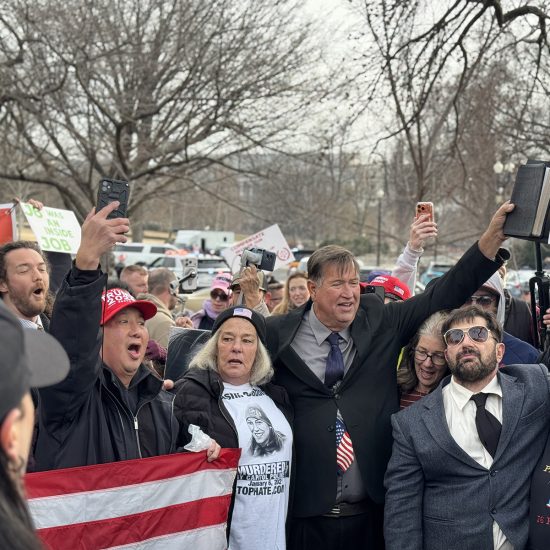

RECKONING WITH POWER: Why the Church Fails When It’s on the Wrong Side of Power. By David E. Fitch. Grand Rapids, MI: Brazos Press, 2024. 221 pages.
When we look out over the Christian landscape in the United States and elsewhere, we see people grasping for power in the name of Jesus so they can control the political, social, and cultural dynamics of nations and the world itself. It might be the local school board or the presidency of the United States, but the goal is the same, establishing dominion over the political/governmental apparatus. In support of this proposal, many turn to a passage in Genesis that speaks of God granting dominion over the earth. It is believed by those who embrace dominionist views that they can reclaim the nation for God and restore a sense of godliness to the nation. Nevertheless, is this desire to secure power over others, as enticing as it may be, the way of Jesus?

Robert D. Cornwall
One answer to that question is provided by David E. Fitch, the B.R. Lindner Chair of Evangelical Theology at Northern Seminary. In his book Reckoning with Power, Fitch takes a deep dive into the question of power and its relationship to the Christian faith. The focus of this effort is, first of all, White evangelical Christians, many of whom at this moment seem quite open to taking dominion, even if it means aligning themselves with a narcissist who is attracted to authoritarianism. Of course, one needn’t be a white evangelical to be enticed by gaining power over others, but the attraction to Christian Nationalism or religious authoritarianism on their part is the most obvious expression of what Fitch discusses in Reckoning with Power. The subtitle reveals why Fitch is most concerned about this current trend. He’s concerned about the effect the pursuit of power over others has on the church. Thus, “the church fails when it’s on the wrong side of power.”
One of the central questions that Fitch addresses in his book is whether there is only one kind of power together with the belief that good people should take upon themselves that power and use it for righteous ends. I’m mindful here of my community organizing training where we were taught the value of gathering power to achieve our goals of justice. Did the kind of power we sought to build in the pursuit of justice fit what Fitch calls power with or was it simply the pursuit of power over? I should point out here that Fitch points to Liberation Theology as an expression of power with rather than power over. In answer to the question of whether there is just one kind of power and that God’s people need to use that power to achieve good things, Fitch suggests there are two kinds of power. There is worldly power, which is coercive, and godly power, which is noncoercive and relationally defined. He suggests that the church and Christians get into trouble when we turn to worldly power to achieve our ends. In other words, we end up on the wrong side of power.
While Fitch focuses his attention on evangelical Christians who seek to gain world power, and who in the course of pursuing that power have experienced corruption, including moral failure, sexual abuse, and abusive relationships in general. This corruption has accompanied an embrace of forms of Christian Nationalism that has exacerbated the situation. He points to the 80% of white evangelicals who voted for Donald Trump in two elections and hail him as a hero (some even speak of him in messianic terms), suggesting that some Christians have lost their bearings. But one needn’t be an evangelical to covet power over others. Historically, the churches known as the mainline sought important seats among the powerful in society so they might influence the course of history. Whatever our starting point theologically (I should note here that I am a retired Mainline Protestant minister who trends liberal/progressive in both my theology and politics. I also call local political leaders my friends and have worked for their election to office), Fitch’s warnings and words of guidance are quite appropriate at this moment in time. As he does so throughout the book, Fitch comes back to Jesus’ own vision of power. This is a vision of power expressed in passages of scripture such as Mark 10:35-45, where Jesus declared that he came not to be served but to serve. Thus, he writes in his introduction that “According to Jesus, the use of worldly ‘power over’ is not just a problem for the church of Jesus Christ; it is a heresy for this church, and it impedes the church’s calling to be the center of Christ’s healing power at work in the world” (p. 15).
The first of six chapters is devoted to defining the many versions of power. He makes it clear that power is everywhere, and it takes many forms, not all of which are problematic. But some forms are problematic. So, we must define power so we can study it and discover why it can go bad, but also how it works in the church. So, he speaks of “power over,” which is the definition of worldly power. There is also “power within,” which involves social systems. There is “power to,” which is empowerment or the ability to do something. Of course, “power to” can involve making use of “power over.” From there Fitch turns to “Power with,” which is a power of relationship that refuses to engage in “power over.” “Power with” generally embraces a posture of nonviolence and involves a form of power that can get things done, but it gets things done differently. Nevertheless, there is, Fitch believes, a temptation to turn to “power over,” a form of power that is prone to abuse and violence. The question he asks here is whether “power with” ultimately will devolve into “power over.”
Having laid out definitions of different forms of power in Chapter 1, Fitch turns in Chapter 2, a chapter titled “Worldly Power and God’s Power,” to a discussion of what “power with” might look like in light of his belief that two primary forms of power exist—worldly and Godly. Recognizing the possibility that “power with” can turn into power over, Fitch suggests that Christians should embrace “power under.” Fitch suggests that there is no such thing as “power with” unless it is submitted to God’s power. He writes that “submitting to God’s power among a people, via the posture of being ‘under’ His reign, I am able to enter a space of God’s power working among us, and then cooperate” (p. 44). He suggests that the Scriptures speak of these two forms of power— “power over” and “power with.” The latter form of power works best when it is exercised as “power under” God’s oversight. He points to Jesus, who strongly declared that one should not lord it over others. If we start with Jesus’ vision of power, then we can interpret the rest of Scripture as it speaks of power. Thus, we view this word about dominion in Genesis through that lens. That is, it should be exercised relationally. When it comes to the Old Testament monarchy, we see “power over” gone bad, for the people chose a king and things did not go well. He also addresses the violence attributed to God’s power, an area of concern for many Christians. He also explores the servant songs of Isaiah and the words of Paul, who addresses the Corinthian church taking the church to task for embracing a form of “power over.” He also takes note of the role power plays in the Book of Revelation. He also takes notice of two important Greek words for power—exousia and dynamis— with the former word most often translated as authority. It’s important that we understand how they are used and the way they apply to our experiences.
In Chapter 3, Fitch addresses the “persistent temptation to blur the powers,” suggesting that the blurring of worldly and godly power stands at the heart of “many of the church’s most egregious sins down through history, including its alignment with (or assimilation of) racism, slavery, Euro colonialism, White supremacy, and various forms of sexual and spiritual abuse. Whenever the church blurs worldly ‘power over’ with the name of God, abuse regularly follows” (p. 72). While Jesus didn’t embrace “power over,” the same is not true for many members of the Christian community beginning in the first century and continuing to the present day. In addressing the blurring of powers, Fitch points to Reinhold Niebuhr’s “Christian Realism” as an egregious expression of this blurring. Now, I must admit, I have found Niebuhr’s realism useful in the past, but it is worth considering that there are dangers present in “Christian Realism,” especially if we are all, in some way, Niebuhrians. He believes this practice of blurring powers is evidence “when a social activist limits God’s work of justice to only what can be accomplished through the government or capitalist funding ventures. It is evident when churches seek to impact culture for God’s morality by getting a Christian elected to Congress or putting Christians in positions of power at influential cultural institutions” (pp. 84-85).
While part of me is attracted to the Niebuhrian vision of power, I’m also aware of its potential for abuse. There is no better expression of abuse than Christian Nationalism. In responding to Christian Nationalism, he suggests that it is an expression of “refusal of God’s power.” One example of this “refusal of God’s power” is the Trumpian message that Christianity is under siege and that only he can overcome this challenge. So, just give him power and Christianity will again be the dominant player (white conservative evangelicalism that is). Fitch speaks here of that attraction of worldly power to accomplish a particular group’s vision of God’s purposes. It often leads to abuse, no matter our starting point, whether we’re conservative or liberal. Now, Fitch understands there is a place for worldly power, but we need to keep it in its proper lane. We need to avoid blurring the two such that we use God as a cover for our power trips. When it comes to Christian Nationalism, he suggests that “using worldly power to force upon people a culture of Christianity in the name of God can only end up in the worst of toxicity, evil, and destruction. Racism, misogyny, and sexual abuse are the result of being filled with the powers gone demonic” (p. 103).
In Chapter 5, Fitch speaks of “Playing God with Worldly Power.” What he addresses here are the more subtle and mundane uses of “power over” that are understood to be undertaken with the “best of intentions.” This is, he suggests, the temptation to play God by attempting to tame worldly power for godly ends. While many Christians believe this is possible, Fitch isn’t one of them. Indeed, he suggests that even trying to “leverage privilege” can be a problem. To overcome this temptation, we must leave room for the Holy Spirit to work. So, he advises us to put Jesus at the center of things, and then we can “make space for the Spirit to work.” (p. 131).
The final chapter of Reckoning with Power is titled “Living under the Power of Christ.” Fitch argues in this chapter that when we live under the power of Christ, we allow the church to find itself on the right side of power. This requires a new imagination that begins with a commitment to mutual submission and the recognition that there is a plurality of spiritual gifts within the church. He writes that leadership is a function of giftedness such that when we operate this way the question of women in ministry, for example, is not an issue. If we operate according to giftedness, patriarchy is undercut. Though fully affirming the place of women in leadership he also warns them to be wary of the attraction to traditional hierarchical structures, which are expressions of “power over.” He also speaks of the importance of listening to one another, so we can discern together God’s direction. He takes note of the segregated church but warns that multiethnic churches can easily devolve into reflecting the culture of the largest ethnic communities.
As an alternative to traditional power dynamics in ecclesial decision-making, Fitch offers the principle of what he calls “IGTHSUS meetings.” It’s important that we note that he uses a G here and not a C. This isn’t a fish meeting. Rather it reflects a statement from Acts 15, where the Jerusalem leaders responded to Paul and Barnabas’ ministry by declaring “It has seemed good to the Holy Spirit and us” (p. 152). The goal here is to listen to the Holy Spirit before acting. In doing this, the church can act under the power of Christ rather than operating on a top-down basis, even if this takes longer than one would like. Here he uses as an example the discussion of LGBTQ inclusion. I should point out here that Fitch is especially focused on the conversations taking place within the evangelical community, even as he notes that more liberal Mainline churches have struggled with this question (as a Mainline pastor who helped lead a congregation through discernment on the question of inclusion, I can attest to the challenge even among more progressive churches). There is much more to this discussion than I can share here, but I believe Fitch offers us a compelling vision in Reckoning with Power for letting go of worldly power and embracing godly power.
As I read David Fitch’s Reckoning with Power, I resonated with the message. It stands close to Jesus’ vision of power and is a welcome word at this moment in time. I also found myself, at points, wondering how feasible this vision is not only in the broader society but more importantly in the church. Getting things done in the church often requires (from experience) a strong hand. Thus, we may see the attraction of blurring worldly and godly power. The danger, of course, is that we may fall prey to the attraction of accumulating power for ourselves, leading to an embrace of forms of authoritarianism, which often leads to scandal and destroyed lives. What Fitch does here is call on Christians to take a close look at the way we view and use power. More specifically, do we embrace godly power, which is power under submission to God, when we make use of power as the ability to accomplish things? That is, is our understanding and use of power relational and noncoercive? My sense is that David Fitch’s Reckoning with Power will help us discern what it means to be on the right side of power, such that Jesus stands at the center and space is given to the Spirit to work in our midst. Thus, we can be thankful for this offering to the church, so that we might navigate these difficult times with grace.
You can learn more about this book by listening to David Fitch on our Dangerous Dogma podcast:
This review originally appeared on BobCornwall.com.
Robert D. Cornwall is an ordained minister in the Christian Church (Disciples of Christ). Now retired from his ministry at Central Woodward Christian Church (Disciples of Christ) of Troy, Michigan, he serves as Minister-at-Large in Troy. He holds a Ph.D. in Historical Theology from Fuller Theological Seminary and is the author of numerous books including his latest “Second Thoughts about the Second Coming: Understanding the End Times, Our Future, and Christian Hope” coauthored with Ronald J. Allen. His blog Ponderings on a Faith Journey can be found at www.bobcornwall.com.






